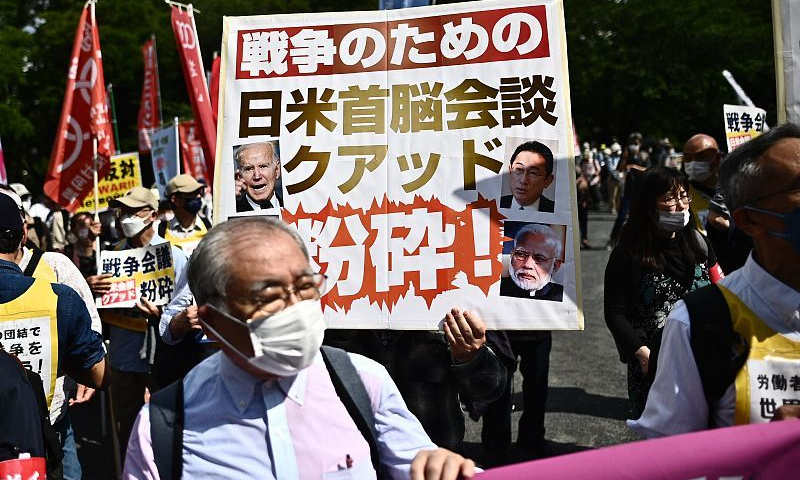
An anti-war demonstration is held in Shinjuku, Tokyo on May 22. Photo: visual.people.cn
US President Joe Biden arrived in Japan on Sunday, his first visit to the country since taking office, and the second leg of his Asia tour where he is expected to meet Japanese Prime Minister Fumio Kishida and attend the summit of the Quadrilateral Security Dialogue, known as the Quad. Biden was greeted by a heated demonstration in Tokyo's bustling area of Shinjuku, where anti-war groups protested against the Quad clique and the meeting of the two heads of state.
Itsunori Ikeda, a leader of the protest, told the Global Times on Sunday that the Biden-Kishida meeting will strengthen the military alliance between the two countries and promote the construction of US military bases and the deployment of Japan's self-defense forces. "It is no difference to turning Japan into a battlefield, which should never be allowed," said Ikeda.
Ikeda noted that real diplomacy should actively think about what we need to do to prevent a war. But now, Japan is following the US and uses a war as a premise for military deployment, a starting point that is inherently problematic and makes it difficult to build a true relationship of trust. It can be said that Japan has lost its real diplomacy, the activist said.
The demonstration was planned since January and joined by over 100 people on Sunday, including Philippines anti-war groups in Japan.
The Quad is using the "China threat" theory as a pretext to expand its armaments to counterbalance China. The combined military expenditure of these four countries is several times that of China's, Ikeda said.
However, the theory has hardly any factual basis and is at best merely "an idea," Ikeda said. Using the theory as a pretext, Japan and the US have strengthened the construction of US military bases in Japan and the deployment of self-defense forces, accelerated military cooperation in space, cyber and other fields, and the discussion of "nuclear sharing" is also very much on the table, which has led to more tensions in Asia.
"The Quad is not ironclad and the interests of the US, Japan, India and Australia are not entirely aligned," Ikeda said. For example, India's neutral position on the Russia-Ukraine conflict has not changed. He believes that the background of the Russia-Ukraine conflict is the anxiety and fear brought by NATO's eastward expansion, and that both the Quad and the strengthening of the Japan-US military alliance will pose a threat to East Asia. "This is a very dangerous provocation," he said.
What worries anti-war groups in Japan more is the expansion of the military alliance with the US. Japanese Prime Minister, Fumio Kishida, made his first visit to the UK and met his British counterpart Boris Johnson in early May and signed a defense agreement that will allow the Japanese and British militaries to conduct training, joint exercises and deepen military cooperation in the Indo-Pacific region. In addition, Japan is actively promoting military and security cooperation with other countries, including France and Germany.
Matsuhira, a participant in the demonstration, told the Global Times that Okinawa was used as a battlefield by Japan and the US during WWII and more than 70 percent of the US military bases in Japan have been concentrated in Okinawa. In fact, there are US military bases and self-defense forces bases in the country, not only in Okinawa, but also in Tokyo. This means that in the event of war, the capital could be targeted at any time, Matsuhira said, noting that the sense of crisis has spread in Japan.
"It is not China that wants to start a war, but the US, which always sees China as a competitor," Matsuhira said, criticizing that the US-Japan military alliance could put Tokyo in a dangerous situation. In case of a war, Japan could become the front line, he said, adding that he participated in the demonstration to urge Japan not to turn into a war zone.
"Japan has lost its real diplomacy and is left with the so-called national security measures," Ikeda pointed out, noting that "true diplomacy should actively think about what we need to do to avoid war. However, Japan has been following the US in military deployment on the assumption of war, which is problematic and makes it difficult to build a true trust relationship." Ikeda also stressed that he hopes the Japanese government will return to the track of real diplomacy as soon as possible.
Additionally, Ikeda noted that given the Kishida administration's current performance, it is speculated that it may continue to "use war" after the elections of the House of Councilors this summer to accelerate military deployment under the pretext of "external threats," thus accelerating the constitutional revision.
He revealed that the anti-war group plans to further promote opposition to prevent the escalation of the Japan-US military alliance from exacerbating tensions in East Asia and to carry out the anti-war movement to the end.




